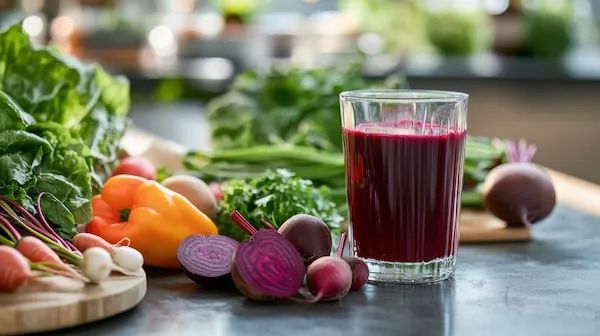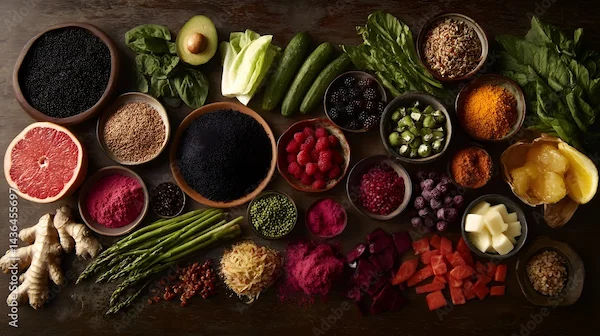Winter Fruits And Vegetables Benefits
In this article, we will explore the myriad benefits of winter fruits and vegetables and why they should be a staple in your diet during the colder months.

Written by
Last updated on 13th Jan, 2026
Introduction
Winter is a season of renewal and rejuvenation. As the temperature drops, our bodies naturally crave warming, nutrient-rich foods. Thankfully, winter offers a bountiful harvest of fruits and vegetables that are not only delicious but also packed with essential nutrients. Incorporating these seasonal produce into your diet can significantly enhance your health and well-being.
The Importance of Seasonal Eating
Before delving into the specific benefits of winter produce, it's essential to understand the concept of seasonal eating. Seasonal eating refers to consuming fruits and vegetables that are naturally grown and harvested during a particular season. This practice aligns our diets with nature's cycles, ensuring that we get the freshest and most nutrient-dense foods available.
Eating seasonally has numerous benefits, including:
Nutritional Value: Seasonal produce is often fresher and retains more nutrients compared to out-of-season items that are harvested early and transported long distances.
Better Flavor: Seasonal fruits and vegetables tend to be more flavorful since they are allowed to ripen naturally.
Environmental Impact: Consuming seasonal produce reduces the need for artificial growing methods and long-distance transportation, thereby lowering the carbon footprint.
Economic Savings: Seasonal produce is typically more affordable due to its abundance during its peak growing season.
Winter Fruits and Their Benefits
Winter fruits are not only delicious but also packed with vitamins, minerals, and antioxidants that can help boost your immune system and keep you healthy throughout the season. Here are some of the top winter fruits and their benefits:
Oranges
Oranges are synonymous with winter, and for a good reason. They are a rich source of vitamin C, which is crucial for a robust immune system. Vitamin C also acts as an antioxidant, protecting the body against free radicals and reducing the risk of chronic diseases. Oranges are also high in fibre, which aids in digestion and helps maintain healthy cholesterol levels.
Pomegranates
Pomegranates are known for their vibrant red seeds and numerous health benefits. They are rich in antioxidants, particularly punicalagins and anthocyanins, which have anti-inflammatory properties. Pomegranates have been shown to lower blood pressure, improve heart health, and even reduce the risk of certain cancers. The fibre content in pomegranates also aids in digestion and promotes a healthy gut.
Apples
The saying "an apple a day keeps the doctor away" holds during winter. Apples are a great source of dietary fibre, which aids in digestion and helps regulate blood sugar levels. They also contain various antioxidants, such as quercetin and flavonoids, which have anti-inflammatory and heart-protective properties. Additionally, apples are low in calories, making them an excellent snack for those looking to maintain a healthy weight.
Persimmons
Persimmons are a lesser-known winter fruit with a sweet, honey-like flavour. They are rich in vitamins A and C, which are essential for maintaining healthy skin, vision, and immune function. Persimmons also contain dietary fibre, which supports digestive health and helps prevent constipation. Additionally, their high antioxidant content helps combat oxidative stress and inflammation.
Custard Apples
Custard apples, also known as sitaphal, are a tropical fruit with a creamy, custard-like texture. They are rich in vitamins B6 and C, which support brain health and boost the immune system. Custard apples also contain essential minerals like potassium and magnesium, which help regulate blood pressure and support heart health. The dietary fibre in custard apples aids in digestion and promotes a healthy gut.
Winter Vegetables and Their Benefits
Winter vegetables are nutrient powerhouses that provide essential vitamins, minerals, and antioxidants to support overall health. Here are some of the top winter vegetables and their benefits:
Carrots
Carrots are a staple winter vegetable known for their vibrant orange colour and sweet flavour. They are high in beta-carotene, which the body converts into vitamin A. Vitamin A is crucial for maintaining healthy vision, skin, and immune function. Carrots also contain fibre, which aids in digestion and helps regulate blood sugar levels. Additionally, the antioxidants in carrots help protect the body against free radicals and reduce the risk of chronic diseases.
Beetroots
Beetroots are a nutrient-dense vegetable with numerous health benefits. They are rich in iron, folate, and antioxidants, which support blood health and improve athletic performance. Beetroots also contain nitrates, which can help lower blood pressure and improve cardiovascular health. The dietary fibre in beetroots aids in digestion and promotes a healthy gut. Additionally, the anti-inflammatory properties of beetroots help reduce inflammation and support overall health.
Spinach
Spinach is a winter green packed with essential nutrients, including iron, calcium, and vitamins A and K. These nutrients support bone health, boost the immune system, and promote healthy skin and vision. Spinach is also high in antioxidants, such as lutein and zeaxanthin, which help protect the body against oxidative stress and inflammation. Additionally, the dietary fibre in spinach aids in digestion and helps maintain healthy cholesterol levels.
Cauliflower
Cauliflower is a versatile winter vegetable known for its mild flavour and numerous health benefits. It is rich in vitamins C and K, which support a healthy immune system and promote strong bones. Cauliflower also contains antioxidants, such as glucosinolates and isothiocyanates, which have anti-inflammatory and cancer-protective properties. The dietary fibre in cauliflower aids in digestion and helps maintain a healthy weight. Additionally, cauliflower is low in calories, making it an excellent choice for those looking to maintain a healthy diet.
Green Peas
Green peas are a nutrient-rich winter vegetable that provides essential vitamins, minerals, and antioxidants. They are high in protein, which supports muscle health and promotes satiety. Green peas also contain fibre, which aids in digestion and helps regulate blood sugar levels. Additionally, the vitamins C and K in green peas support a healthy immune system and promote strong bones. The antioxidants in green peas help protect the body against free radicals and reduce the risk of chronic diseases.
Radishes
Radishes are a crisp and refreshing winter vegetable with numerous health benefits. They are rich in antioxidants, such as vitamin C, which help protect the body against free radicals and reduce inflammation. Radishes also contain essential minerals like potassium and magnesium, which help regulate blood pressure and support heart health. The dietary fibre in radishes aids in digestion and promotes a healthy gut. Additionally, the natural diuretic properties of radishes help detoxify the body and support overall health.
Organic vs. Conventional Winter Produce: Which Is Better for Your Health?
As you enjoy the benefits of winter fruits and vegetables, you might wonder whether to choose organic or conventional produce. While both options provide essential nutrients, there are some key differences that could influence your choice.
Organic Produce is grown without synthetic pesticides, fertilisers, or genetically modified organisms (GMOs). Many people choose organic because they believe it’s a healthier option for both the body and the environment. Organic farming practices also tend to support soil health and biodiversity, making it a more sustainable choice for the planet.
Conventional Produce, on the other hand, is typically grown using synthetic pesticides and fertilisers. While it’s often more affordable and readily available, conventional produce may have traces of pesticide residues, though they are generally within the safety limits set by regulatory authorities.
Which Should You Choose?
Both organic and conventional winter fruits and vegetables offer great nutritional benefits. If you’re particularly concerned about pesticide exposure, especially for items that are consumed raw like apples or leafy greens, opting for organic might give you peace of mind. However, if cost is a concern, conventional produce is still a healthy choice and can provide the same essential nutrients.
Ultimately, the best choice is to enjoy a variety of fruits and vegetables—organic or conventional—while ensuring that they’re fresh and properly washed to minimise any pesticide residue.
Conclusion
Winter offers a unique opportunity to enjoy a variety of delicious and nutrient-rich fruits and vegetables. By incorporating seasonal produce into your diet, you can reap the numerous health benefits they offer while also supporting sustainable and environmentally friendly practices. So, this winter, make a conscious effort to include more winter fruits and vegetables in your meals and experience a positive impact on your health and well-being.
In summary, winter fruits and vegetables are not only a delight to the palate but also a boon to your health. From boosting your immune system to promoting heart health, these seasonal products offer a wide range of benefits. Embrace the abundance of winter produce and enjoy a healthier, more vibrant life.
Consult Top Dietician
Consult Top Dietician

Ms. Malabika Datta
Dietician
17 Years • Msc. in Dietetics & Food Service Management
Kolkata
Dr Utsa Basu Clinic, Kolkata
(25+ Patients)

Ms. Soma Saha
clinical nutrition
17 Years • B.Sc. - Home Science (Food & Nutrition), M.Sc. - Home Science (Food & Nutrition)
Kolkata
Dr Utsa Basu Clinic, Kolkata
(50+ Patients)

Ms. Sreeparna Dey Dhara Deb
Dietician
10 Years • DNHE
Bansdroni
Siddhita Healthcare., Bansdroni

Ms. Samapti Maity
Dietician
16 Years • MSc. (Clinical Nutrition & Dietitics), NDEP, Course in Maternal Infant Young Child Nutrition.Diploma in Sports Nutrition, Diploma in Diabetic educator, FODMAP Specialist
Kolkata
BIENETRE CLINIC, Kolkata

Dr Darshana R
General Physician/ Internal Medicine Specialist
15 Years • MBBS, MD, DNB (Internal Medicine), Diploma in Allergy, Asthma and Immunology , Fellowship in Diabetes
Bengaluru
Apollo Clinic, JP nagar, Bengaluru
(125+ Patients)




